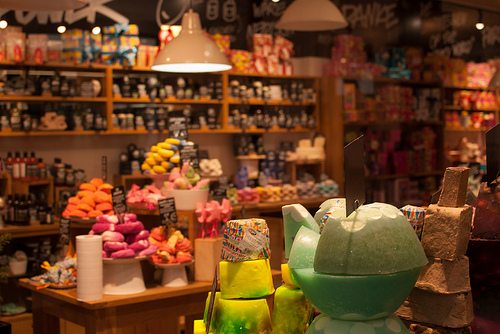

Features
War on the high street: Lush’s battle against environmental destruction
Lush’s ethical director Hilary Jones speaks to Ilaria Bertini about ethical cosmetics and sustainable spending.
First comes the scent, then the look. Anyone who has ventured into one of Lush’s many stores around the UK knows the retailer has a very original and sensory way of presenting its products: cheese-style soap blocks, solid shampoo bars and toothy tabs.
Founded in Dorset in 1994 by six co-founders, Lush has been advocating natural, fresh and handmade cosmetics since the beginning – whilst at the same time lobbying for an end to animal testing for beauty products, supporting various charities through its Charity Pot initiative and promoting the use of renewable energy.
Speaking to Blue & Green Tomorrow, Lush’s ethical director Hilary Jones explains the thinking behind package-free cosmetics.
“A solid product has no water and therefore it is very difficult for yeasts and bacteria to grow – so they require no added preservatives. Also a solid product does not require a plastic bottle or pot”, she says.
“No preservatives is a win for the health of the customer and no packaging is a win for the planet. If you then ensure that you strictly do not animal test those products, it is a win for animals, too. Who wouldn’t want their business based on that?”
Lush has become increasingly popular in Britain and across the world, proving that ethics and economic success can go together. The Lush Prize, awarded annually in conjunction with Ethical Consumer magazine, awards £250,000 to brilliant ideas that aim to replace the use of animals in cosmetic testing.
Asked what has been the retailer’s biggest accomplishment, Jones says, “I am most proud that we have carved our own furrow and have dared to be different throughout the years, no matter how much we were the rank outsider. I have watched the company build from one small shop to a global entity, without us ever once seriously compromising our beliefs. That is an achievement in today’s world.”
The ethical consumer market is growing in the UK, despite the recent recession. In 2013, it rose by 12% compared to 2012, to £54 billion revenue. Meanwhile, surveys and market research confirmed that consumers are becoming increasingly aware of ethics while shopping and are demanding greater choice, at more competitive prices.
“Customers talk to us about their concerns every day, so we know it is genuine. The advances in global communications has meant that problems of far away communities now seem very up close and personal and a growing realisation that climate change is real and is happening about us has really focused people to want an answer to the problems they see,” Jones says.
“What you buy is a form of self-empowerment, whereby even if world governments aren’t providing solutions, people can at least feel that they can make some changes and choices of their own.”
With climate change and resource depletion set to heavily affect the global economy by the end of the century, it is imperative that the retail sector, and not just its ethical branch, focuses on how to deliver customers goods that are environmentally and socially sustainable, sourced responsibly and possibly deliver some good.
“At the moment it is hard to pretend that there is balance anywhere on this planet”, Jones concedes.
“Things are not right at the moment and there is still huge social and economical injustice and at the same time there is environmental erosion. So we all clearly need to do better. Not just individuals and companies – but as a global community that is standing on the doorstep of climate change.”
Sustainability is a broad concept that does not only concern big corporations and governments, but the choices we make every day, she adds.
“It means looking at the facts and seeing what we can do in our home lives, our work lives and in our outreach to the community around us. If we all take these issues seriously and work collectively, then answers could be found.
“Huge advances are made in times of war – we need to go into battle against social injustice and environmental destruction.”
Photo: Oscar Hanzely via flickr
Further reading:
Beauty bloggers call for an end to cosmetic animal testing
One in four people happy to spend more on ethical products
British shoppers want cheaper fair trade products, survey finds


 Environment12 months ago
Environment12 months agoAre Polymer Banknotes: an Eco-Friendly Trend or a Groundswell?

 Features11 months ago
Features11 months agoEco-Friendly Cryptocurrencies: Sustainable Investment Choices

 Features12 months ago
Features12 months agoEco-Friendly Crypto Traders Must Find the Right Exchange

 Energy11 months ago
Energy11 months agoThe Growing Role of Solar Panels in Ireland’s Energy Future





























